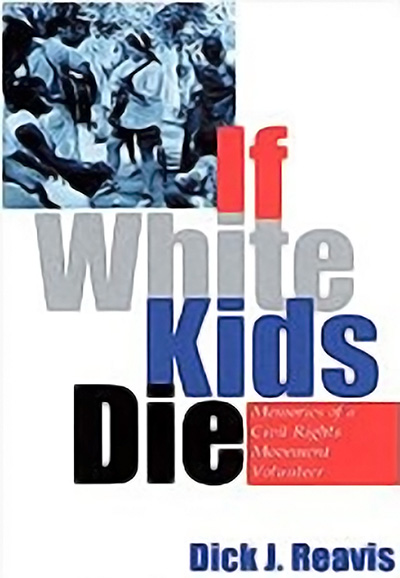
About Reavis's If White Kids Die
The summer of 1964 had been “Freedom Summer” for a few campuses. The Student Non-Violent Co-Ordinating Committee (SNCC) had drawn some five hundred students, most of them white, from Ivy League and prestigious universities to help its integration efforts in Mississippi. An up-and-coming leader named Stokely Carmichael had told a group of prospective volunteers in New York that SNCC wanted to be sure that if blacks were killed for the civil rights cause, whites would die with them. What he said was prophetic, even if it wasn’t popular. A few weeks after his speech, three young men—two white and one black—were murdered in Philadelphia, Mississippi. The nation was scandalized.
While he wasn’t aware of Carmichael’s strategy when he decided to join a 1965 summer voter registration program, Dick J. Reavis felt it instinctively when he told his resistant father the reason he was going. “Dad, if we live in a country where nobody pays attention when Negroes die, then I guess that’s the way it has to be. Somebody has to pay the price.” The price the white middle-class Texan paid when he spent a summer on the wrong side of the tracks in Demopolis, Alabama, was his innocence.
If White Kids Die describes his gradual maturation as he encountered the other side of legally enforced racism. Harassed by police for being in a white neighborhood with a black coworker, arrested for vagrancy, and prevented from driving by arcane residency laws, Reavis came to understand the frustration with “The System” that fueled the Civil Rights Movement. At the same time, he saw the infighting and strategizing within the Movement that prevented it from living up to his ideals. In the end, he concludes, “The System made some concessions to our protests, but its power was never trumped… But history has not ended, and deep in my heart, I do believe that we—virtually the whole human race—will overcome someday.”
“A valuable and honest addition to the existing literature on white movement volunteers.” —David J. Garrow, Presidential Distinguished Professor, Emory University School of Law
“I was fascinated reading about the actions and thoughts of various figures in the movement that I had never heard of before. These low-level functionaries and local activists are what we very much need to know more about… It is also good to have a memoir of a white participant… and one that gives us the view from the bottom up rather than one that deals with leadership decisions and conflicts… It is unique; it is refreshing. I found its aura of naiveté, of simplicity and wonder, a real change of pace in writings about the Movement.” —Harvard Sitkoff, Professor of History, University of New Hampshire
Classroom Adoption
If White Kids Die: Memories of a Civil Rights Movement Volunteer is a recommended text for use in classrooms where the following subjects are being studied: History, American.
If White Kids Die describes the author’s gradual maturation as he encountered the other side of legally enforced racism. Harassed by police for being in a white neighborhood with a black coworker, arrested for vagrancy, and prevented from driving by arcane residency laws, Reavis came to understand the frustration with “The System” that fueled the Civil Rights Movement. At the same time, he saw the infighting and strategizing within the Movement that prevented it from living up to his ideals. David J. Garrow, Presidential Distinguished Professor at Emory University School of Law calls it “a valuable and honest addition to the existing literature on white movement volunteers.”
Adopted By
[“Bellevue Community College Lower Columbia College for "History of the United States from 1860" and "American Political Systems"”, “University of New Hampshire”]
About the Author
DICK J. REAVIS, member of the Texas Institute of Letters, a senior reporter for the San Antonio-Express News, former senior editor of Texas Parks & Wildlife and Texas Monthly, is author of The Ashes of Waco and Diary of an Undocumented Immigrant, among other books. He lives in San Antonio.
Buy Now
If White Kids Die: Memories of a Civil Rights Movement Volunteer
129 pp. 5 photos. Index.